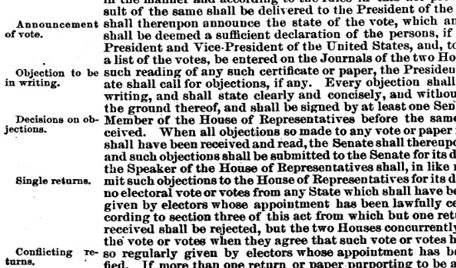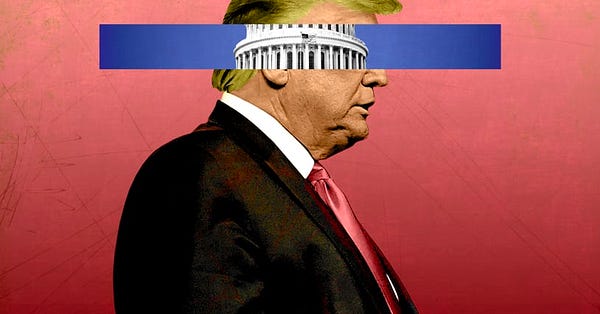Is Electoral Count Act Reform In the Works?
I hope so. The voting rights bill is good, but ECA reform is more essential.
Apologies for repurposing a tweet thread of mine from earlier today into a post, but I’m afraid you get what you pay for around here.
President Biden was in Georgia today, pounding the table on voting rights, and calling for the Senate to exempt legislation in that crucial area from the filibuster so it can be passed with a simple majority. I’m not sure precisely what he intended to achieve by this speech, but if the goal was to put pressure on Democrats like Senator Joe Manchin of West Virginia and Kyrsten Sinema of Arizona—or on Republicans like Lisa Murkowski of Alaska and Mitt Romney of Utah—to eliminate or scale back the filibuster, I doubt it will work.
I suspect, rather, that this exercise in presidential rhetoric was mostly aimed to his left, with a goal of placating those frustrated that a voting rights bill has been stalled in the Senate with little prospects for passage under current rules. Now at least he can say that he put his own reputation on the line for the bill, and if it failed, it’s not his fault.
On the merits, I’m largely with the president. I’ve said before, I think we should have a constitutional amendment protecting the right to vote. I’m also sympathetic to the argument that the filibuster, by creating a supermajority requirement in the Senate, weakens democratic accountability to no good end.
But I also think that bipartisan support for election rules is crucial. Democrats are up in arms precisely because partisan Republican legislatures are passing laws that they think unfairly restrict access to the ballot. That anger has fueled a lot of increased Democratic turnout. If Democrats succeed in overturning those rules by nationalizing the question, I suspect they’ll ignite a partisan backlash that will overwhelm the effect of the laws themselves. Eventually, we have to find a way to work together again on rules that both sides can live with.
Fortunately, it sounds like a bill dealing with an even more crucial threat to democracy is starting to come together in the Senate, and I think its chances for winning bipartisan support aren’t bad.
The bill in question is described as a revision of the Electoral Count Act, because it appropriately limits congress's and the VP's role in counting electoral votes. But it also prevents state legislatures from overriding a properly conducted election after the fact. This is the first serious effort I’ve seen to try to prevent outright election theft, which is a real concern given former president Trump’s behavior after losing his reelection bid.
In essence, what the bill does is reduce the latitude of both congress and state legislatures to intervene in the event of a dispute about the result of a presidential election in a given state. Congress would be clearly prohibited from rejecting a state’s certified electors without an overwhelming majority. State legislatures, meanwhile, would not be able to dispute an election result on their own recognizances. And the Vice President’s role would be reaffirmed as purely ceremonial. In the event of a dispute over the legitimacy of a count in a given state, federal courts would be the final arbiters.
That’s my understanding of how it would work, and given the current dynamics of politics if I have to pick a final arbiter of electoral disputes, I’d rather go with the courts than with either congress or the state legislatures. Doing so won’t solve all our problems, or even assure general acceptance of election results. But it’s a more likely route to such acceptance than anything else on offer, and it’s more likely still if the bill passes with substantial bipartisan support.
So how likely is that? Four Republican senators are cited by The Washington Post as being interested in the reform: Susan Collins (ME), Mitt Romney (UT), Thom Tillis (NC) and Roger Wicker (MS). You need to get to ten to avoid a filibuster. Who else is a likely target?
I'd start with the five senators who voted to convict President Trump in his second impeachment trial: Richard Burr (NC), Bill Cassidy (LA), Lisa Murkowski (AK), Ben Sasse (NE) and Pat Toomey (PA). After that I look to other Republican senators who have been pointed in their acknowledgement that Trump lost the election, like Todd Young (IN), Shelley Moore Capito (WV) and most recently Mike Rounds (SD).
Three Republican senators are retiring who did not vote to convict: Rob Portman (OH), Roy Blunt (MO) and Richard Shelby (AL). They all seem worth approaching; certainly they have less to lose than their colleagues if they cross Trump. Finally there's the leadership itself, Mitch McConnell (KY) and John Thune (SD), who have both said they are open to ECA reform.
That's well more than the ten votes you'd need. Of course, you still might not get them. But it's crazy to suggest it isn't worth the effort.
I understand voting-rights advocates' concerns that a shift of focus might mean the John Lewis Voting Rights Advancement Act won't pass. But as things stand right now, it's not going to pass. It has only 51 votes, and needs 60 to break a filibuster, and Joe Manchin reiterated his opposition to limiting the filibuster to pass it just before Biden spoke. Moreover, while I think that bill is laudable and if I were in congress I would vote for it, the bulk of the evidence suggest that the kinds of voting restrictions that have been passed in recent years haven’t have a major impact on turnout or election results.
Meanwhile, the true doomsday scenario is where the losing party refuses to accept the loss and refuses to relinquish power and/or turns to violence. That's the world we had a preview of on January 6th of last year. Preventing that has to be the top priority. And I should reiterate, as I’ve argued before, that what we’re trying to prevent is not just Republican theft but also Democratic perception of Republican theft, which could also lead to violence. A partisan process is bound to be distrusted in the best of times, and these are not the best of times. Passing an ECA reform along the lines described could do a great deal to prevent that scenario as well.
I also understand concerns that ECA reform might be a bait-and-switch, something that Republicans abandon after the voting rights bill fails. But nothing stops the Democrats from ditching the filibuster and passing the voting rights bill after such a failure. Indeed, I can't think of anything more likely to change Manchin's mind about the possibility of bipartisan cooperation than if Republicans refused to support a law to ensure election results are respected. That's one reason I think such a law could well get Republican support.
We’ll see whether I’m right about that. I hope I am. My uncertainty on that score, though, doesn’t diminish my conviction that it’s amply worth it to try. Passing this kind of ECA reform wouldn't solve all the problems in our democracy by a long shot. But getting any kind of bipartisan effort to shore up election integrity, however limited, would be a significant win, and not something to minimize.






